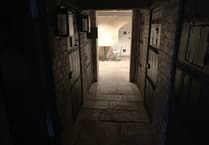In celebration of the 60th anniversary of the much-loved BBC series, Doctor Who, a special after-dark water-based projection in Cardiff Bay will take audiences on the incredible journey through 60 years of the show.
With a script arranged by former Doctor Who script editor Gary Russell and featuring the brand-new version of composer Murray Gold’s iconic theme, the audio-visual spectacle, which will launch on Doctor Who Day, will feature key highlights from throughout the many iterations of the series, including The Doctor, as well as companions and foes of the Time Lord, plus an exclusive shot featuring upcoming fifteenth Doctor Ncuti Gatwa.
The water-based projection, commissioned by BBC Wales, begins on Thursday 23 November – Doctor Who Day - and runs until Saturday 25 November at Roath Basin in Cardiff Bay, which has a long history with the series. The after-dark showings will run every half hour from 5.30pm until 9.30pm on those days, with each lasting approximately 5 minutes. The initial switch-on, scheduled for 5.30pm on Thursday 23 November, will be hosted by Steffan Powell, presenter of Doctor Who: Unleashed.
The longest running sci-fi TV show in the Universe, Doctor Who first appeared on BBC television on 23 November 1963, with William Hartnell as the first Doctor. Originally running for 26 years before coming to an end in 1989, the show would be relaunched triumphantly onto TV screens in 2005 after a 16-year hiatus - overseen by showrunners Russell T Davies and Julie Gardner and produced by BBC Wales with many local locations around Abergavenny and Monmouth appearing in its stories.
A newly published economic impact report details how the sci-fi series has contributed to the Welsh economy. Between 2004 and 2021, Doctor Who has generated approximately £134.6m in GVA, of which more than £113.1m was in the Welsh creative industries. The report also shows that for every £1 spent on the hit series, a subsequent £0.96 is generated in Wales, making its economic contribution £1.96. The analysis considers the impact of Doctor Who from the start of production on Series 1 in 2004 to the most recent series with Jodie Whittaker as the Doctor (Series 13), which was broadcast in 2021.
Doctor Who’s return was a pivotal moment and became a catalyst for the immense growth of the Welsh creative industries over the last 15 to 20 years. The screen sector – comprising of production, post-production, digital and special effects for film and TV, and TV broadcasting – is now the largest of the five Creative Industry sub-sectors prioritised by the Welsh Government and accounted for more than £459m turnover in 2022.
In addition to the water-based projection in Cardiff Bay, the 60th anniversary celebrations will also include the opportunity for visitors to Cardiff to see the TARDIS and one of the Doctor’s most notorious villains, a Dalek, at the Senedd building from Thursday 23 November, until Saturday 2 December.
This builds towards the return of the series to TV screens on Saturday 25 November, with the first of three 60th Anniversary Specials to feature fourteenth Doctor David Tennant, who made a surprising return in last year’s The Power of the Doctor. Airing on BBC One and iPlayer, ‘The Star Beast’ finds The Doctor reunited with Donna Noble, played by Catherine Tate, for the first time in many years. The second of the specials, ‘Wild Blue Yonder’, airs on BBC One and iPlayer on Saturday 2 December, with ‘The Giggle’ completing the trio a week later.
Produced by Bad Wolf with BBC Studios, the specials mark the return of Russell T Davies to the Doctor Who brand as showrunner and sees him teaming up once more with Bad Wolf co-founder Julie Gardner, who is executive producer alongside Bad Wolf co-founder Jane Tranter.
The company providing the water projection is LCI Productions and permission was granted to use Roath Basin by Cardiff Council and Associated British Ports. Coleridge Cymru assisted in facilitating the project.



